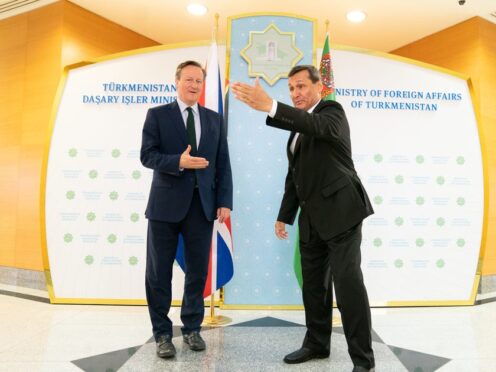
Lord David Cameron has denied suggesting Brexit is to blame for an asylum returns deal with France being off the table.
The Foreign Secretary said the Dublin Regulation “no longer exists whether you’re in the EU or out of the EU”.
The regulation, which allowed member states to send asylum seekers to other EU countries, is being replaced by a different system as countries struggle with the scale of migration and are reluctant to accept transfers.
It comes after Lord Cameron said that a cross-Channel returns agreement was “not possible” because of “the situation we’re in, because of the attitudes of others and all the rest of it”.
The remarks were widely seen as an admission that he believes the UK’s departure from the bloc is the reason why a deal cannot be struck with France.
Speaking to the PA news agency, the Foreign Secretary said: “No, it’s not that. The situation we’re in is that the Dublin Convention no longer exists whether you’re in the EU or out of the EU.
“The problem is it’s not possible to have that returns deal with France, that’s why we have looked at innovative solutions.”
Lord Cameron, who called the Brexit referendum before fronting the Remain campaign, told ITV’s Peston show on Tuesday that he would “love” for the UK to still be able to return migrants to France.
The remarks were seen as at apparent odds with the Government line that a deal with a EU country is not possible because the bloc would insist Britain taking a quota of migrants as part of the agreement.

The Foreign Secretary defended the controversial plan to deport some asylum seekers to Rwanda as “the right one” to the problem of small boat crossings in the Channel.
Rishi Sunak’s Bill to save the stalled asylum scheme has passed Parliament after weeks of wrangling between MPs and peers, but ministers are braced for further legal challenge, with the judiciary making 25 courtrooms available to deal with cases.
Defending the Safety of Rwanda legislation earlier this week, Andrew Mitchell MP said statistics suggest Kigali is “arguably safer than London” and the objections of some peers to the plan “border on racism”.
Asked whether he shared the views of the deputy foreign secretary, who appears on behalf of the Foreign Office in the Commons chamber, Lord Cameron said: “We always speak with one voice.”
Asked whether he believes Kigali is safer than London, the Foreign Secretary said: “I’m always driven by the data.”
Mr Sunak previously hinted he was open to leaving the European Convention of Human Rights (ECHR) amid pressure from the Tory right over the UK’s membership in the treaty.
Some, including former minister Andrea Jenkyns, have called for a manifesto pledge to hold a referendum on whether to leave the convention, which they say is a barrier to implementing the Rwanda plan.
Asked whether he was against a plebiscite given his own experience with the Brexit vote, Lord Cameron said he did not believe leaving the treaty was necessary to start the stalled deportation scheme.
“I don’t think to deliver our policy it’s necessary to leave the ECHR, but I’ve had my quarrels with the ECHR in the past and we should always robustly stand up for the rights of the British government to deliver British policy.”
Lord Cameron called the Brexit referendum as he contended with the rise of the right-wing Ukip party while Tory leader, before heading the failed campaign to remain in the bloc and resigning following the result.
Asked what advice he had for Mr Sunak as he contends with Reform UK alongside a sustained double-digit poll lead held by Sir Keir Starmer’s Labour, the Foreign Secretary said: “I think the most important thing is to set out the choice the country faces … I think that there are some similarities with 2015 when it comes down to it.
“There’s the man with the plan and there’s the man with absolutely no plan.”

Enjoy the convenience of having The Sunday Post delivered as a digital ePaper straight to your smartphone, tablet or computer.
Subscribe for only £5.49 a month and enjoy all the benefits of the printed paper as a digital replica.
Subscribe